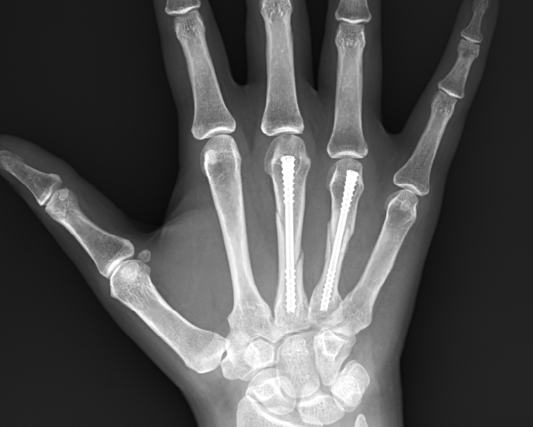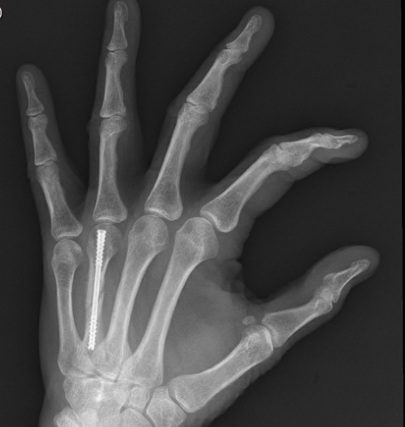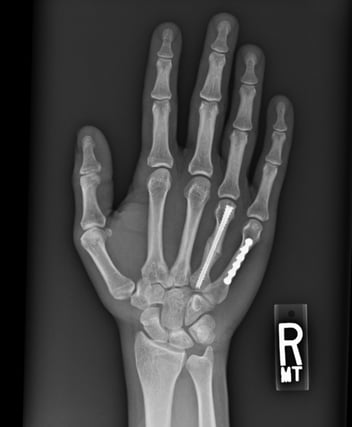MEET THE SURGEON

Dr. Jordan Grier, MD
- Orthopaedic Surgeon at OrthoCarolina, Charlotte North Carolina
- Specializing in upper extremity (Hand, Wrist, Elbow, and Shoulder)
- Medical Degree and Residency Training, Duke University Medical Center
- Subspecialty Training, OrthoCarolina Hand Center
DISCLAIMER
The opinions expressed by Dr. Grier are those of Dr. Grier and not necessarily those of Field Orthopaedics. Individual experiences may vary.
The procedure described in the report may differ from the manufacturer’s surgical technique. Surgeons are advised to review the product specific surgical technique prior to performing any surgery.
A surgeon must always rely on their own professional clinical judgement when deciding whether to use a particular product when treating a particular patient. A surgeon must always refer to the instructions for use, product label and surgical technique before using any Field Orthopaedics product. Product may not be available in all markets. Please contact your Field Orthopaedics representative if you have any questions about availability of Field Orthopaedics products in your area.
OVERVIEW
A 24-year-old otherwise healthy male presented to Dr Grier’s Level 1 Trauma Center following a motorcycle accident, sustaining closed fractures of the distal radius, as well as the index, long, ring, and small finger metacarpals of the right hand. The fractures were managed operatively using a combination of a dorsal bridge plate for the distal radius, a dorsal spanning plate for the index metacarpal, and intramedullary NX Nails for the long and small finger metacarpal fractures. A spanning plate was used for the ring metacarpal fracture due to the complex, intra-articular nature of the fracture. Postoperatively the patient exhibited excellent recovery, with near full range of motion and a return to work and recreational activities without limitations.
CASE INTRODUCTION
The patient, a 24-year-old right-hand-dominant male, was involved in a high-impact motorcycle collision. Radiographs confirmed closed fractures of the distal radius as well as the index, long, ring, and small finger metacarpals. Due to the patient's active lifestyle and the necessity for full hand function restoration, operative fixation was chosen to expedite recovery and minimize functional limitations.
CASE PRESENTATION
Upon examination, the patient had significant swelling and tenderness in the right hand, with limited motion due to pain. Radiographs confirmed fractures in the distal radius and metacarpal shafts. All fractures were noted to be closed injuries with an otherwise intact soft tissue envelope. The patient exhibited a normal preoperative neurovascular examination to the right upper extremity.
PRE-OPERATIVE PLAN
Radiographs revealed distal radius and metacarpal shaft fractures, leading to the decision for surgical intervention to achieve stable fixation.
Below: Pre-Operative Imaging


Surgical and non-surgical treatment options were discussed. Considering the patient’s desire for a prompt return to recreational activities, surgical fixation was chosen. A dorsal bridge plate was utilized for fixation of the distal radius fracture, allowing for concomitant fixation across the index metacarpal fracture. Intramedullary NX Nails were selected for fixation of the long and small finger metacarpals to provide stable fixation and allow early range of motion. Due to the high degree of comminution and intra-articular involvement of the ring finger metacarpal fracture, a dorsal spanning plate was chosen to restore anatomic length, rotation, and alignment.
SURGICAL APPROACH
The patient underwent surgery one week after the injury under general and regional anaesthesia.
Reduction
Intraoperative fluoroscopic imaging was utilized to confirm anatomic fracture reduction of the distal radius and index metacarpal fractures prior to fixation. Incisions were fashioned over the dorsum of the hand in the interspaces between the index and long finger metacarpals as well as ring and small finger metacarpals to allow for plate placement over the dorsum of each the index and ring finger metacarpals.
Bone Preparation
A combination of intraoperative fluoroscopic imaging and direct visualization of the fracture sites was utilized to confirm anatomic reduction of each of the metacarpal fractures. Guidewires were placed percutaneously in the long and small finger metacarpals. Fluoroscopy confirmed proper guidewire positioning across the fracture sites, and the corresponding drill sizes were used to prepare the medullary canals for the NX Nails.
Definitive Fixation
NX Nails (3.0 x 50mm for the long finger and 3.5 x 55mm for the small finger) were inserted retrograde over the guidewires, maintaining anatomic reduction. The NX Nail’s compaction taper head maximized engagement at the metacarpal head, offering rotational and longitudinal stability. The smooth shaft allowed passage through the isthmus with minimal endosteal irritation. This provided stable fixation while bridging the fracture and facilitating indirect healing and callus formation through controlled micromotion. For the ring finger metacarpal fracture, which extended into the carpometacarpal joint, a dorsal spanning hand plate was selected to ensure anatomic reduction of the fracture site and fourth carpometacarpal joint. Fluoroscopy confirmed proper alignment and fixation.
Below: Intra-Operative Imaging

POSTOPERATIVE PROTOCOL
One week postoperatively, the patient was seen for initiation of the recommended hand therapy protocol including fitting of a removable thermoplastic orthosis, allowing free movement of the metacarpophalangeal joints. Active range of motion was initiated immediately. Radiographs showed steady fracture healing over the following weeks.
FOLLOW UP
At four weeks, the patient had regained full flexion of the hand, making a complete fist, with no signs of hardware complications. By six weeks, the patient demonstrated a full range of motion in all fingers, full active forearm supination and pronation, with no functional limitations. At the 12-week follow-up, the patient returned for removal of the dorsal plates and resumed work and recreational activities without restrictions.
Below: 2 week Post Operative

Below: Final Post Operative - plates removed

Below: 4 week Post Operative
Below: 6 week Post Operative
CONCLUSION
The stable fixation facilitated early mobilization and rapid functional recovery. The combination of intramedullary nailing and dorsal plating resulted in a full return to activity for the patient with no complications.
Product Resources
Field Orthopaedics. (2024). NX Nail Phalanx Long Surgical Technique. Brisbane, Australia: Field Orthopaedics.
FO-010315-MM Version 2 April 2025




